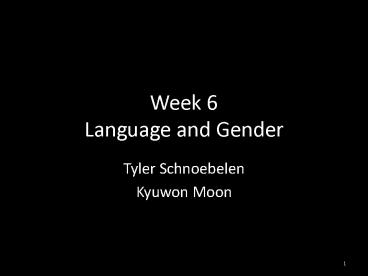Week 6 Language and Gender PowerPoint PPT Presentation
1 / 23
Title: Week 6 Language and Gender
1
Week 6Language and Gender
- Tyler Schnoebelen
- Kyuwon Moon
2
(No Transcript)
3
(No Transcript)
4
(No Transcript)
5
Big themes
- These chapters talk a lot about moves and
positioning - This connects to the course theme about gender
(and other constructs) being something we do. - Were walking that tightrope between agency (if
youre going to talk about moves, someone is
making em) and social structure (constraints,
prior positionings)
6
(No Transcript)
7
An alternate universe
8
Agency
- Quick follow-up
- You can think of agency as the ability to do
things in the world. The important thing is that
it happens relative to larger social structures. - People (agents!) can do a lot of stuff, but
social structures are everywhere, so a
super-agentive theory (Up With People) still
has to figure out what the constraints are, where
they come from, how people interact with them.
9
Agency and
- Agency, intention, and consciousness
- I didnt mean/intend it!!
- Because you use dude and occasionally say that
is so gay!, you are a male chauvinist pig? - Indexical field
- The meanings are out there, and we only have an
access to it (although we are all participating
in meaning making processes). - Doesnt have to be an intentional or conscious
move
10
Face
- Positive face
- We, affiliation with others
- Getting approval, building belonging
- (We like each other)
- Negative face
- I, a separate individual
- Carving out a space
- (I deserve respect, you shouldnt impose too
much, I have needs)
11
Face-threatening Acts
- Inevitable component in social interactions
- Negative Face-threatening Acts
- When speakers/hearers do not avoid disrupting
their interlocuters freedom of action. - Positive Face-threatening Acts
- When the speakers/hearers do not care about their
interlocuters feelings.
12
So, what?
- Face positive and negative
- the basic wants in any social interaction
- Importance of cooperation in interaction
- Universality of Face?
13
(No Transcript)
14
Politeness
- Positive politeness
- To minimize the threat to the hearers positive
face - Admiration, playfulness, familiar terms of
address - Negative politeness
- To emphasize avoidance of imposition on the
hearer - Showing respect/deference (not quite the same)
- Apologies, thanking, formal terms of address
15
Tag questions
- Epistemic modal (uncertainty)
- She was behind the 2-meter line, wasnt she?
- Facilitative
- That was amazing acting, wasnt it?
- Softening
- You didnt have right of way, did you?
- Challenging
- You designed this software for you not your
users, didnt you?
16
Tag question questions
- Which ones of those are actually weak?
- What else do they do?
- Is it gender? Powerlessness?
- Do you create weakness for yourself? Can you
really be more assertive?
17
Hedges and discourse particles
- Hedges probably, sorta
- Discourse particles You know, of course
- These arent really about content, but
positioning. - (Things are very rarely empty, as we keep
seeing.)
18
Intersections
- Okay, weve got the following things in the mix
(and a lot more). How do they interact with the
idea of politeness? - Gender
- Social class
- Culture
19
Other stuff
20
Typology of speech acts
- Know about performative speech acts
- I now declare you husband and wife.
- But probably worry less about the others
- Locutionary acts
- Normal speech/writing
- Illocutionary acts
- Promise, invite, praise
- Perlocutionary acts
- Persuade, frighten, comfort, impress
21
Affective/instrumental speech
- Affective
- How sad, Damn it, What ___ they are
- Instrumental
- The hippo is the most dangerous mammal in
Africa - But really, all speech is both
22
Chapter 5 examples
- All of these mark relationships between speakers.
What are the similarities and differences in how
they work? - Terms of address (boy, miss, Dr.)
- French tu/vous
- Japanese honorifics (verb forms, o- suffix, wa/zo
particles)
23
(No Transcript)

